Spiral review
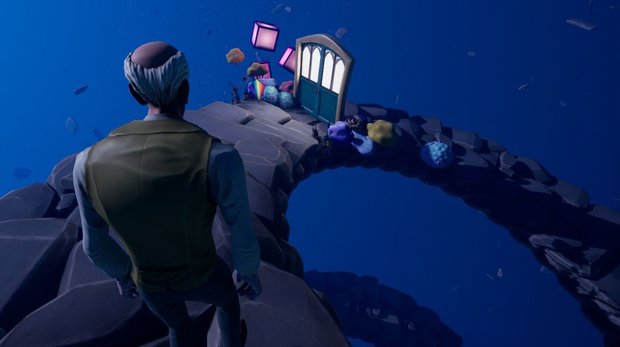
- 1 Comment
Brought down somewhat by large story gaps, but otherwise a thoughtful, lovely reflection on the ravages of cognitive degeneration
Growing older is an inevitable part of life, and although some try to fight the ravages of age, it is something we can’t escape, no matter how much we desperately battle it. Next to wrinkles, greying hair and increasing back pain, there is the uncomfortable realisation that memory is a fickle thing. Becoming a little forgetful with age is normal, but cognitive degeneration can be a more severe part of getting older, and whether it is you who experiences it personally or someone close to you, it is a torturous and all-consuming condition. Canadian developer Folklore Games have made a game showcasing what it might be like to experience such an illness, in the thoughtful and narrative-driven Spiral. Though the subject matter can be heavy, its loveable main character and minigames contribute to a simple but heartwarming and impactful experience that, if you allow it to, will leave a lasting impression.
Even before the game begins, its protagonist is introduced through a letter written to you, Bernard Penfield’s old and dear friend. Bernard is an elderly writer who is coming to the devastating realisation that his mind is slowly beginning to deteriorate, and he wishes for you to take one last trip with him down memory lane. The game starts with Bernard on a train that has reached its last stop, but the surroundings are unrecognisable to him and he can’t even remember why he got on the train to begin with. As he disembarks, he is greeted by the dog Elfie, who seems to recognize him and leads him into a largely empty blue void toward an ever-descending spiral, a literal spiralling stone staircase. As he goes further and further down, Bernard walks through doors that lead to different memories from his childhood and youth, revisiting his favourite moments with his family and friends, but also more painful recollections such as losing his parents.
The gameplay in Spiral consists mainly of Bernard walking around and looking at stuff, remembering things about his surroundings and the people in them. Sometimes he is a spectator of scenes played out, where he merely reflects on the encounter through voice-over, and sometimes we get to re-enact his memories in person. Moving Bernard around the various 3D locations is pretty straightforward, whether you prefer mouse and keyboard or a gamepad. I personally used the latter, just because the camera is easier to steer that way. When Bernard is close to a hotspot, it is indicated with a blue exclamation mark and interacting with it is as easy as a button press or keystroke. One thing I found out after actually finishing the game, was that you can make Bernard walk a little faster in the settings, if you think his old man gait is too slow. I personally didn’t see this as an issue though, as I felt that his deliberate pace was fitting for his age, just adding to the immersion. Playing as younger Bernard, you can manually go faster by pressing shift or the left trigger.
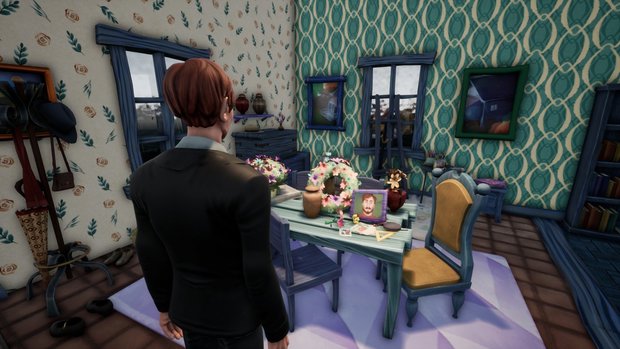
Although this is a narrative-focused game, there are quite a lot of tasks and minigames that make the game more interactive than a pure walking simulator. For example, as Bernard fondly reminisces about a conversation he had with his friend Emily in what is probably their teens, you have to steer a kite and change its speed to navigate it through checkpoints in the air around various beautiful scenery while you listen to them talk. This isn’t the sort of minigame you can fail, just a mindful moment as you hold the kite in a third-person perspective.
Another minigame requires a (presumably) twentysomething Bernard to help his mother at the library where she works, by putting books back onto the shelves. You can put them in place willy-nilly like a psychopath, or try to place them where they belong based on categories such as Geography or History, though which you choose has no impact on the story other than possibly triggering or missing out on an achievement. Your objectives are displayed on little Post-its on the screen, and although there isn’t much challenge to the minigames, they do break up the gameplay and add to the storytelling in an inventive way. Building a wooden chair with Bernard’s father and making burgers at his friends’ diner become more meaningful memories when they are acted out this way instead of just told through narration.
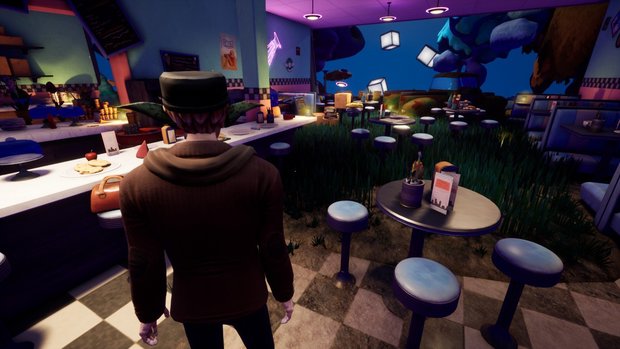
There is one minigame that I wish had been used a little bit less, and that’s the turn-based combat sequences. Looking back at his teenage years, Bernard and three of his friends play a lot of “C&C,” a fantasy table-top roleplaying game that is just like D&D but with Castles and Creatures instead. The four friends are literally transported into the board game on the table, and we see their real silhouettes looming vaguely in the background. Here they venture through dun… err, I mean castles, and must challenge whichever pizza-themed creatures they meet on their quest.
Some minigames in this mode are simply environmental puzzles, but most of the time there is combat, and quite a lot of it too. No dexterity is needed, as the characters take turns and choose their attack from a menu, just as in classic RPGs. Fans of this style of gameplay will probably enjoy it, but I found it tedious and annoying, especially since most of the other minigames are one-offs but combat is recurring throughout. Other than being a fond memory for Bernard, I fail to see how these sequences add anything to the story, and I found them to be too drawn out and out of place. Thankfully they aren’t very difficult to win, so once you have defeated whichever foe you need to get past, you can go on with escaping the castle.
At the beginning of the protagonist’s journey, his recollections are clear, bright and coherent, but as he ventures further down the spiral, it is clear that Bernard increasingly loses his grip on his mental faculties. His memories seem to become more confusing to him, and therefore to us as well. Not only does he mix up names and eventually forget his own family, but the scenery around him also literally begins to crumble. Details like a clock face, which in the beginning is correct but later becomes more and more scrambled, are not only thoughtful, but also painfully real if you are familiar with the effects of cognitive degeneration. Bernard tries to record his memories in a journal, where he also keeps track of the different people in his life, but this too becomes progressively difficult for him further down the spiral. Names become partially erased or crossed out, and whole sections become unreadable as time goes by.
Despite its heavy, depressing theme, for the most part the general tone of the game is very light-hearted and bright. Bernard doesn’t let his failing memory get him down, and even the graphics are vibrant and joyful. Presented in a stylised, almost cartoony art style, Spiral is as colourful and beautiful to look at as it is gut-wrenching to play through. The characters are a little bit stiff, though, as they don’t always move naturally and stand still even when they are engaged in conversation. There isn’t any lip sync or facial expression either, further adding to the feeling that the character design is missing something. Thankfully the voice acting is very good; Bernard as an old man is an especially touching performance, but the rest of the cast does an equally noteworthy job.
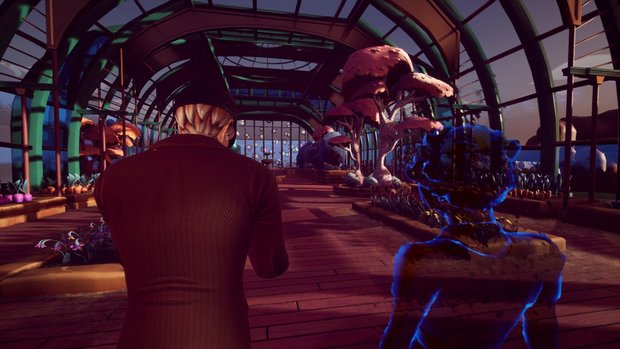
The soundtrack is also beautifully composed, with moody piano tunes, whistling, humming and guitar playing throughout. There isn’t much variety, but the few tunes here are lovely, with perhaps one exception. Every time the game centres around Bernard and his friends playing C&C, the same monotonous rock riff plays over and over. This got a bit annoying since some of these sequences tend to drag out, and listening to the same music on repeat might have added to my dislike for these combat-heavy parts of the game.
Spiral is divided into four parts, each reserved for different family and friends of Bernard, although the story jumps a lot between different age periods. Some memories are from his early childhood, going all the way up to young adulthood. We get to see happy memories from the cabin where he and his family spent many joyous summers, a scene from school with an especially unpleasant teacher, and afternoons in the library with Bernard’s sister and mother. It was at times a bit difficult to keep track of the chronology of things, partly because of the order of the memories, but also because it isn’t always clear how old Bernard is in the specific flashbacks. Sometimes he looks very young but sounds older, and other times he seems older but still sounds like a little boy. This certainly didn’t help me keep track of all his friends and family, who was married to whom and which parents children belonged to. These things might have been done purposefully to give a greater sense of Bernard’s confusion, but it certainly didn’t make me feel any wiser.
Even though we get to know his friends and family quite well, I wish I got to know Bernard himself a little better. Apart from the fact that he is a writer, I am left knowing basically nothing about him. Did he marry, or have a love in his life? Did he ever experience anything noteworthy, other than publishing his novels? The main focus in the game is on his early years, and we get to know practically nothing about his adult life.
This is a pretty slow-paced experience, in more ways than one, and whether you choose to rush through the story or seek out every little memory and keepsake, the game will take between 5 to 10 hours to complete. However, this is not a game made for speeding through, so I would recommend at least spending some time exploring and getting acquainted with the many details of Bernard’s memories, as you might discover things that you would otherwise miss. There are also non-essential collectibles to find along the way, such as postcards, figurines and journal entries.
Final Verdict
Spiral is a truly heartfelt, beautiful homage to the people affected by cognitive degeneration, though its difficult subject matter makes it an emotionally challenging experience and certainly not one to “enjoy” in the usual sense. Several times I had to force myself to return to the game because the premise is so depressing. Even though the general spirit is playful and light here, it can’t disguise the fact that there is no light at the end of the tunnel – for Bernard or for those in real life who are diagnosed with these kinds of illnesses. It’s all handled maturely and with respect, making it easy to see what the developers wanted to convey, but be forewarned if this is a particularly sensitive subject to you. The gameplay, while varied enough to keep things mostly feeling fresh, is never particularly deep, and it’s a shame we get to uncover so little about the protagonist’s adult life, but a lovely presentation and thoughtful exploration of a painful reality ensure you’ll still be thinking about it long after you’re done.
Hot take
There isn’t much in the way of brain teasers, but Spiral is a heartwarming story with a heartbreaking premise that follows its mentally deteriorating protagonist on his last trip down memory lane.
Pros
- - Touches on the subject of cognitive degeneration in a very respectful way
- - Charming visual style
- - Wonderful voice acting
- Nice variety of minigames
- Beautiful, moody score
Cons
- Fragmented storytelling can be a bit confusing
- Not enough focus on the protagonist himself
- Overused turn-based combat minigame
- Character graphics are a bit static
Aurora played Spiral on PC using a review code provided by the game's publisher.



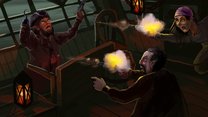




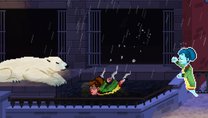

1 Comment
Want to join the discussion? Leave a comment as guest, sign in or register in our forums.
Thank you so much for your review <3
Reply
Leave a comment